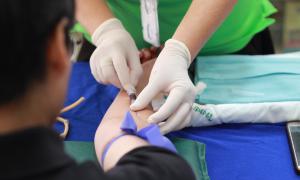Treating with Remdesivir immediately after diagnosis of COVID-19 reduces the risk of hospitalization and death in vulnerable patients with severe disease by 87%

The international study will be presented at the IDWeek international conference and includes the participation of 562 unvaccinated people
An international study with the participation of the Fight AIDS and Infectious Diseases Foundation, IrsiCaixa and the Infectious Diseases Service of the Germans Trias i Pujol University Hospital has shown that intravenous administration of the antiviral drug Remdesivir during the 3 days right after diagnosis of COVID-19 reduces the risk of hospitalization by 87% in people susceptible to severe disease. Administration of this drug has also decreased the number of disease-related medical visits by 81% (see table). Disease-related adverse events have been reduced from 7.1% in patients who did not receive treatment to 3.6% in patients who did receive the antiviral drug.
A total of 562 unvaccinated individuals at high risk of severe COVID-19 for different reasons, such as diabetes, obesity or hypertension, participated in the study. These people have been divided into two groups: one that received Remdesivir three days in a row right after the diagnosis of COVID-19 and another that, instead of the antiviral drug, has received placebo. The entire group of participants was monitored for 28 days and evaluated whether they had required hospitalization. In this way, the research team has been able to demonstrate that Remdesivir acts by preventing disease progression and reduces the risk of developing a severe disease requiring hospitalization or even death by 87%.
According to Roger Paredes, head of the Infectious Diseases Department of the Germans Trias i Pujol University Hospital and co-author of the study, "the efficacy of antiviral treatment with Remdesivir has been demonstrated in reducing the complications of SARS-CoV-2 infection and, therefore, it could be a very good tool for preventing the collapse of ICUs and avoiding emergency situations such as the one we have experienced in hospitals. The effect is greater than that detected with other antiviral drugs in the early stages of the disease". Although the drug can currently only be administered intravenously, Paredes states that "we are working on an oral formulation of this compound that will greatly facilitate treatment from primary care centers". The Can Ruti Infectious Diseases Service is evaluating other oral antivirals such as those from Pfizer or Merck, which will provide patients with more alternatives.
This clinical trial has counted with the participation of the North Metropolitan Primary Care of the Catalan Health Institute (ICS) and the Emergency and Infectious Diseases Service of the Germans Trias i Pujol University Hospital and will be presented during the international conference on infectious diseases IDWeek.
Hospitalization/death, medical visits related to COVID-19 and adverse effects of Remdesivir treatment on day 28:
